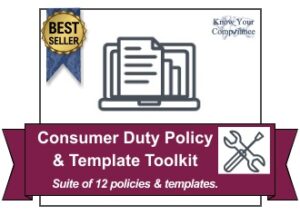FCA Consumer Duty Guidance
This article provides information on the Consumer Duty and offers suggestions for complying with the rules and outcomes. We have put the FCA Consumer Duty guidance into simple to read sections and have included controls and tools for adherence to the Duty requirements.
What is The Consumer Duty?
The FCA’s Consumer Duty (“the Duty”) came into force on the 31st of July 2023 after the publication of the final rules and guidance. Regulated firms with retail market business are subject to the Duty and have obligations under the new rules. Firms who communicate or approve financial promotions addressed to, disseminated to or received by a retail customer are also bound by the rules.
The Consumer Duty rules and outcomes have been designed to ensure firms deliver a higher level of protection and security to retail customers. The Duty demands clearer standards, as well as the fair treatment of retail customers through product governance and fair value assessments.
Consumer Duty Outcomes & Rules
 The Duty itself comes with a host of expectations and rules that are set out under the PRIN 2A module of the FCA Handbook. Alongside the guidance and requirements, there is an additional FCA Principle for Business and Conduct Rule. Together these set out the standard of behaviour expected of firms. The cross-cutting rules and outcomes apply to all retail market business and retail customers, from product and service origination through to distribution and post-sale activities.
The Duty itself comes with a host of expectations and rules that are set out under the PRIN 2A module of the FCA Handbook. Alongside the guidance and requirements, there is an additional FCA Principle for Business and Conduct Rule. Together these set out the standard of behaviour expected of firms. The cross-cutting rules and outcomes apply to all retail market business and retail customers, from product and service origination through to distribution and post-sale activities.
- PRIN 2A – Comprised of the cross-cutting rules, four outcomes and Consumer Duty guidance. PRIN 2A sets out the rules and requirements firms must adhere to when they have obligations under the Duty.
- Principle 12 (Consumer Duty) – A firm must act to deliver good outcomes for retail customers – The additional Principle for Business specified by the FCA reflects a general expectation by the regulator on how firms should conduct their retail market business. The expectation is conduct to a standard which ensures an appropriate level of protection for retail customers.
- Conduct Rule 6 – Act to deliver good outcomes for retail customers – To ensure compliance with this rule, a firms’ employees should adhere to the cross-cutting rules. This means they must act in good faith towards and avoid causing foreseeable harm to retail customers. The firm should also ensure employees enable and support retail customers to pursue their financial objectives.
Complying with The Consumer Duty
There are a series of policies and procedures you will need to develop to aid compliance with your Consumer Duty obligations. If you read through PRIN 2A and the associated FG22/5 final non-handbook guidance for firms, you will find the rules and outcomes that you are required to adhere to. As with most FCA rules, there is a requirement to have policies and controls in place to ensure compliance with the Consumer Duty.
Consumer Duty Policy
The Consumer Duty Policy template should set out your objectives and obigations for complying with the Consumer Duty. This policy should be a reference document for your business and employees that sets out your aims, intent and processes for adhering to the rules and outcomes. It should set out the cross-cutting obligations, four consumer outcomes and how these interact with Principle 12 and Conduct Rule 6.
Product Governance
The Product Governance Approval Process describes the stages used to approve retail products and services for consumer use. Firms are required to design and deliver products and services that have the customer and their best interests at their core. This process document and associated product governace policy should set out the retail product’s journey; from design, through to approval. This includes, but is not limited to identifying the appropriate target group and defining distribution channels for the product.
Outcome Monitoring Framework
The Outcome Monitoring Framework policy and procedures should implement a set of templates for testing retail customer outcomes. This means establishing a review and monitoring framework to examine and evaluate the outcomes received by retail customers. The frequency of outcome monitoring and what information must be collected should be identified and documented to ensure adequate and effective data. The procedures should also detail how the firm will report to the governing body on an annual basis and any actions to be taken should a retail product or communication result in poor outcomes.
Consumer Duty Template Toolkit
 If you are looking to develop a professional, compliant set of templates and policies in this area, why not consider using our Consumer Duty Template Toolkit. With more than 9500 firms using our documents, you can customise the content and incorporate 12 essential consumer duty policies and tools to aid compliance with the PRIN 2A rules.
If you are looking to develop a professional, compliant set of templates and policies in this area, why not consider using our Consumer Duty Template Toolkit. With more than 9500 firms using our documents, you can customise the content and incorporate 12 essential consumer duty policies and tools to aid compliance with the PRIN 2A rules.
Designed for any FCA regulated business with Principle 12 and PRIN 2A obligations, these customisable templates give you a firm foundation on which to build a compliant product governance program. With tools and templates for implementing a product governance approval process and outcome monitoring framework, why reinvent the wheel!
- 12 Essential Consumer Duty Templates
- Fully Customisable Content
- Suitable for all Business Types
- Aligned with PRIN 2A Rules
- Instant Download After Payment


